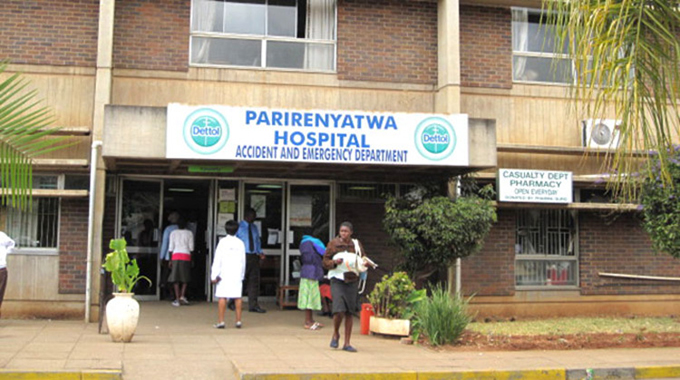Restore quality of health, forge medical tourism

Tapiwa Maswera Correspondent
Andrew Fleming (now Parirenyatwa) Hospital was built for a minority white population of Rhodesia in 1974.
When it was built, it set health standards for the white population of Rhodesia at a level never seen before on the African continent.
That concept — the best health system on the continent — is worth exploring.
Zimbabwe can and should build the best health system on the African continent, and then become the medical tourism Mecca of Africa.
To understand how, consider this.
Zimbabwe had a population of seven million at independence, and the logical decision after attaining freedom would have been to build more hospitals like Parirenyatwa.
This would have extended health services to all Zimbabweans after independence without compromising quality.
Zimbabwe’s population has doubled, hence the need for more health facilities.
We did this before with our education system when we built thousands of schools and a State university in every province.
A rich medical tradition
The first three black doctors to ever qualify in Rhodesia, Dr Samuel Tichafa Parirenyatwa, Dr Silas Mundawarara and Dr Edward Pswarayi, were all trained in South Africa.
It is fitting that the biggest hospital in Zimbabwe is named after its first black doctor — Dr Parirenyatwa, who was no ordinary medical doctor.
He was also the vice president of ZAPU and a committed revolutionary who understood the health needs of his people.
It took a lot of character to complete medical studies in those days. And it still does, notwithstanding the hundreds of doctors that Zimbabwe produces annually from its medical training institutions.
Pioneers
Rhodesia was named after Cecil John Rhodes, a former prime minister of the Cape and a British imperialist and a follower of John Ruskin.
It was Ruskin who delivered a lecture at Oxford on February 1870 saying “ . . . youth of England, make your country great again . . . for all the world a source of light, a centre for peace. This is what England must do or perish: she must find colonies as fast and as far as she is able . . . seizing every piece of fruitful waste ground she can set her foot on, and teaching these her colonists . . . that their first aim is to advance the power of England by land and by sea”.
It was Cecil John Rhodes’ firm belief that the British had a civilising mission and that civilisation was a function of race.
He believed natives were incapable of self advancement, and they needed hand-holding, like children.
This may explain why Rhodesia made no effort to produce black graduates in its first 70 years of existence.
Black Hole
As they qualified, the pioneering black doctors faced many challenges.
Questions were being asked about their pedigree. Could they cure white people? Were they Westernised enough to understand the special needs of white people? Could a black gynaecologist attend to a white woman?
Of course, nobody had ever asked whether white doctors were Africanised enough to understand the special needs of black people.
Black people were deemed not to have special needs.
It is not difficult to see why Tichafa Parirenyatwa became a politician, the situation in the then Rhodesia demanded that he became one.
But it appears that the gap that he wanted to fill still persists. Young doctors are qualifying in droves, but our health system is not expanding fast enough to allow them to contribute meaningfully.
Creating the future
Health insurance is the fastest growing form of insurance. And insurance savings will provide the seed capital for growing the economy.
The medical tourism and insurance value chain is very lucrative and it is a way to build a firm foundation for the future by taping into our history of excellence in medical training.
It is easy to create the cheapest medical facility in the region which is anchored by excellence in pillars of health tourism such as cosmetic surgery, hip replacement, cosmetic dentistry and so on.
Medical Tourism
Cecil John Rhodes was partly attracted to Africa because of the warm weather that was good for his ill-health.
He later formed a company that colonised this country on behalf of the British government.
There are many British people who would come to Zimbabwe to convalesce if our health system was world class.
Throw in Victoria Falls.
The time has come for the medical value chain in this country to be run like a business, and the insurance industry could also start taking medical insurance seriously.
Zimbabwe can and should become the number one medical tourism destination in Africa.
Conclusion
Medical tourism is a low-hanging fruit, and very lucrative. It requires sound value chains in which the Government and private sector collaborate.
Like Andrew Fleming Hospital in 1974, Zimbabwe can ascend to the top of the healthcare industry in Africa because the basic ingredients are all there.










Comments